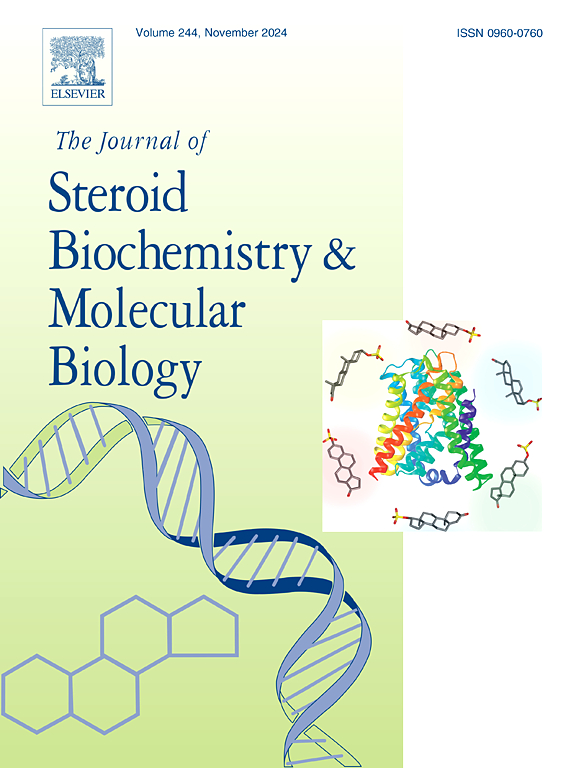开心散通过调节胆固醇稳态改善过量摄入 27-OHC 小鼠的学习和记忆障碍
IF 2.7
2区 生物学
Q3 BIOCHEMISTRY & MOLECULAR BIOLOGY
Journal of Steroid Biochemistry and Molecular Biology
Pub Date : 2024-09-24
DOI:10.1016/j.jsbmb.2024.106622
引用次数: 0
摘要
胆固醇及其氧化产物--氧化甾醇平衡--在维持认知功能方面发挥着至关重要的作用。中药开心散(KXS)在治疗精神疾病和调节阿尔茨海默病(AD)认知功能障碍方面具有显著疗效。本文旨在探讨开窍散是否能通过调节胆固醇平衡来增强认知功能。我们采用 27- 羟基胆固醇(27-OHC)诱导的认知功能障碍小鼠模型和评估神经细胞损伤的细胞培养模型,研究了学习和记忆能力,同时探讨了通过调节胆固醇代谢减少神经细胞损伤的问题。通过减轻淀粉样蛋白-β(Aβ)的沉积、减少炎症反应和减轻突触可塑性损伤,21 天的 KXS 治疗改善了 27-OHC 超载小鼠的学习和记忆能力。此外,它还能修复髓鞘功能。更重要的是,KXS 通过大幅抑制肝 X 受体(LXR)、ATP 结合盒转运体(ABCA1、ABCG1)、载脂蛋白 E(ApoE)的表达和细胞色素 P450 46A1(CYP46A1)的上调,明显影响中枢胆固醇的代谢。此外,KXS 还可通过 CYP46A1 促进胆固醇向 24-羟基胆固醇(24-OHC)的转化,抑制星形胶质细胞释放胆固醇,从而减轻 27-OHC 诱导的神经元炎症和凋亡。总之,我们的研究结果表明,KXS 可以防止 27-OHC 负荷引起的学习和记忆障碍。这种作用可能与 KXS 的多靶点能力有关,它能促进过量胆固醇转化为 24-OHC,并维持神经元和星形胶质细胞之间的胆固醇平衡和代谢。本文章由计算机程序翻译,如有差异,请以英文原文为准。
KaiXinSan improves learning and memory impairment by regulating cholesterol homeostasis in mice overloaded with 27-OHC
Cholesterol and its oxidative products—oxysterols homeostasis— play a crucial role in maintaining cognitive function. Chinese medicine KaiXinSan (KXS) has demonstrated effectiveness in treating mental illness and regulating cognitive dysfunction of Alzheimer's disease (AD). The purpose of this article is to explore whether the KXS can enhance cognitive function by regulating cholesterol homeostasis. Employing the 27-hydroxy cholesterol (27-OHC) induced mice model of cognitive dysfunction and coculture model of assessment neurocyte damage, we investigated learning and memory abilities while concurrently addressing the reduction of neuronal cell damage through the regulation of cholesterol metabolism. 21 days of KXS treatment improved the learning and memory ability in mice 27-OHC-overloading by alleviating the exacerbated deposition of amyloid-β (Aβ), reducing inflammatory reactions, and mitigating synaptic plasticity damage. Additionally, it repaired myelin sheath function. More importantly, KXS significantly affects the metabolism of central cholesterol by substantially inhibiting the expression of liver X receptor (LXR), ATP-binding cassette transporter (ABCA1, ABCG1), apolipoprotein E (ApoE) and upregulated cytochrome P450 46A1(CYP46A1). Furthermore, KXS may alleviate 27-OHC-induced neuronal inflammation and apoptosis by promoting the conversion of cholesterol to 24-hydroxycholesterol (24-OHC) via CYP46A1 and suppressing cholesterol release from astrocyte cells. Altogether, our results demonstrate that KXS can prevent learning and memory impairments induced by 27-OHC loading. This effect may be related to its multitarget capability in promoting the conversion of excessive cholesterol to 24-OHC and maintaining a balance in cholesterol homeostasis and metabolism between neurons and astrocyte cells.
求助全文
通过发布文献求助,成功后即可免费获取论文全文。
去求助
来源期刊
CiteScore
8.60
自引率
2.40%
发文量
113
审稿时长
46 days
期刊介绍:
The Journal of Steroid Biochemistry and Molecular Biology is devoted to new experimental and theoretical developments in areas related to steroids including vitamin D, lipids and their metabolomics. The Journal publishes a variety of contributions, including original articles, general and focused reviews, and rapid communications (brief articles of particular interest and clear novelty). Selected cutting-edge topics will be addressed in Special Issues managed by Guest Editors. Special Issues will contain both commissioned reviews and original research papers to provide comprehensive coverage of specific topics, and all submissions will undergo rigorous peer-review prior to publication.

 求助内容:
求助内容: 应助结果提醒方式:
应助结果提醒方式:


